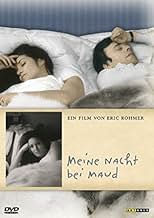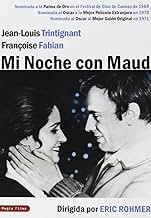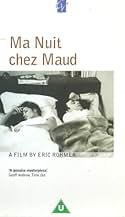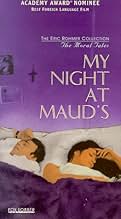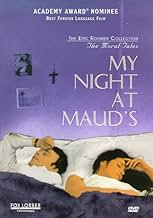I rigidi principi di un devoto cattolico vengono sfidati durante un soggiorno di una notte con Maud, una donna divorziata con una personalità fuori misura.I rigidi principi di un devoto cattolico vengono sfidati durante un soggiorno di una notte con Maud, una donna divorziata con una personalità fuori misura.I rigidi principi di un devoto cattolico vengono sfidati durante un soggiorno di una notte con Maud, una donna divorziata con una personalità fuori misura.
- Regia
- Sceneggiatura
- Star
- Candidato a 2 Oscar
- 6 vittorie e 6 candidature totali
- Marie
- (non citato nei titoli originali)
- Student
- (non citato nei titoli originali)
Recensioni in evidenza
Two men, Jean-Louis and Vidal meet again after 15 years. They decide to go to visit Vidal's friend, Maud. In Maud's apartment the group of three have interesting discussions about Pascal, philosophy, moral and religion. What makes these discussions so interesting is the difference of Vidal, Jean-Louis and Maud. Jean-Louis is a catholic who believes in the holiness of man. Vidal is a Marxist who replaces God with history, he believes in history instead of God. Maud is an atheist, who believes in true short-term happiness. When Vidal leaves the apartment, Jean-Louis gets to a moral dilemma.
Jean-Louis talks a lot about a young blond woman he saw in church, Francoise. He doesn't know anything about her, but she represents religious and an ideal woman to him. Where Maud is the opposite to him. Jean-Louis doesn't believe in short-term happiness. So as he spends the night at Maud's he gets to a moral dilemma. According to his religious beliefs he should resist the temptation of Maud. Again his lie to Francoise is Christian compassion, but it's also a desire to hide his dishonesty.
My Night at Maud's goes very deep. It's not just about what's on surface: the intellectual dialogs and the moral dilemmas. The intelligence of Rohmer goes much deeper. And that is what I like in his films, even if you don't understand everything, the films have something that make you watch them again and again. I'm 17 and when I walked into a dark theater to see this fine film, I was blown away. When the film is over, you have came from a moral journey. So Eric Rohmer's film, obviously doesn't just stop at being the battlefield of ideologies.
Because it is a dialogue-driven piece, much more happens in the 54-minute-long "Suzanne's Career", Rohmer's second moral tale, than in "My Night at Maud's", which is about an hour longer. It can seem meandering at times, especially the first-half of the film, but put your trust in Rohmer. We're being bored to death for a reason. Listening to two Frenchmen discuss Pascal's Wager isn't very entertaining, but the payoff comes when, later on in the film, the characters are put into situations in which they have to make their own Pascal's wager, metaphorically speaking. The reward comes when we see these philosophies which they discussed tested in real-life situations, and we see how true, or untrue, to their ideals these characters are.
During the first fifty minutes, you may be bored out of your skull, but the way the film unfolds, you'll probably want to go back and watch the first fifty minutes again after it's over.
After Vidal leaves, Maud tells Jean-Louis about her marriage, her ex-husband's Catholic mistress, and the tragic end to her affair with the only man she truly loved. When he is persuaded to avoid a snowstorm and stay overnight, Jean-Louis has to overcome Maud's advances and his own temptations to remain faithful to his ideal mate, a blond, Catholic girl (Marie-Christine Barrault) he recently met at church.
This was the first film I'd seen by Eric Rohmer and it was a puzzle to penetrate the uniqueness of his style and rhythm. Rohmer presents his characters in very natural, almost mundane situations, and heightens the realism by using only natural sounds of the environment. On the surface, the film appears very simple but underneath there is much complexity. Jean-Louis is conflicted between his Catholic principles and his love of sensual pleasure. He lives in a world centered almost entirely on himself, engaging in much philosophizing about choice but never choosing. He operates out of how he "should" or "should not" act rather than out of his experience of what works. When life does not fit his pictures, he deceives himself with endless rationalizations. Through his experience with Maud, however, he is shaken out of need for complete self-control and discovers the epiphany of grace.
Rohmer has a light touch and employs intelligent and witty dialogue to bring his characters to life. In the process, he creates an impersonal elegance that is totally captivating. Rohmer doesn't set out to change our lives just to make us think, and in My Night at Maud's, he succeeds admirably.
There is a refreshing lightness and maturity to the way in which these characters (and perhaps the French in general) treat love affairs. They are spoken of as anything else in life, there is understanding when someone wants to move on, and when a woman says 'no', it's respected, without further pursuit. Vidal leaves Jean-Louis alone with Maud for the night, knowing there is an attraction between the two, and it's interesting to listen to them talk about their views while she lightly flirts with him. In his view, she has two strikes against her - one physical (she's not a blonde, his preference), and one spiritual (she's not a Catholic). On the other hand, it's because there seems to be no chance of a relationship that they seem so happy and natural together. Their scene later in the snow is fantastic. Unfortunately, he's already become attached to another woman he's seen in church (Marie-Christine Barrault), who, while blonde and Catholic, seems less interesting and less sensuous, setting up an interesting choice for him.
It's telling to me that despite his earnestness and apparent honesty, he tells each of them early on that he feels he's known her for ages. There is something devastatingly honest about hearing that, as we no doubt repeat ourselves in different relationships, and it can be read as being disingenuous, or as commentary that we can connect with many different people in life, and tend to do so, so that our final partner is somewhat arbitrary, even if influenced by certain principles.
While parts of the film were slow and I wish the philosophical discussions hadn't been so specific to Pascal and Jansenism, I liked the intelligent, meaningful conversations these characters have. I also liked the street footage in the wintertime, during the Christmas holidays, which is clearly real and adds to the film's aesthetic. Françoise Fabian lights up the screen in her scenes, and plays the most interesting character, one I empathized with (divorced, single mom) and related to (more down to earth, and what I would call a spiritual atheist). The ending scene makes us both wistful and accepting at the same time. It's not a perfect film, or even one I would recommend without at least some reservations, but at the end I found I had liked it.
Eric Rohmer's film is full of dialogue. The characters talk and talk, often so intellectually that I had trouble keeping up. But the talk is interesting and intriguing. The main theme (it appeared to me, anyway) is the value of faith in a world where the likelihood of heaven is becoming increasingly unlikely. Jean-Louis, a former ladies man, fights his urges when Maud invites him into her bed. He eventually climbs in, feeling the cold, and begins to kiss her. He eventually pulls away, looking almost angry with himself. He obviously feels that an eternity in heaven, however unlikely the idea is, is worth more than a moment of weakness and happiness.
The dialogue-heavy scenes may not appeal to everyone, it can at times be difficult to engage with the film and bourgeois characters. But it is richly rewarding and a highly intelligent character study. The film has an almost love/hate attitude to the idea of Christianity in a similar way to many of Bergman's greatest films. One of the most intellectually stimulating films of the French New Wave movement.
www.the-wrath-of-blog.blogspot.com
Lo sapevi?
- QuizJean-Louis Trintignant's character is never called by name in the entire film. He is shown in credits as "Jean-Louis."
- BlooperAfter the night spent at François' student apartment, Jean-Louis Trintignant and Françoise go to church and later talk. For a moment, the boom mic drops into view from the top.
- Citazioni
Jean-Louis: Are you still a Marxist?
Vidal: Absolutely. For a Communist, Pascal's wager is very relevant today. Personally, I very much doubt that history has any meaning. Yet I wager that it has, so I'm in a Pascalian situation. Hypothesis A: Society and politics are meaningless. Hypothesis B: History has meaning. I'm not at all sure B is more likely to be true than A. More likely the reverse. Let's even suppose B has a 10% chance of being true and A has 80%. Nevertheless I have no choice but to opt for B, because only the hypothesis that history has meaning allows me to go on living. Suppose I bet on A, and B was true, despite the lesser odds. I'd have thrown away my life. So I must choose B to justify my life and actions. There's an 80% chance I'm wrong but that doesn't matter.
Jean-Louis: Mathematical hope. Potential gain divided by probability. With your hypothesis B, though the probability is slight, the possible gain is infinite. In your case, a meaning to life. In Pascal's, eternal salvation.
Vidal: It was Gorky, Lenin or maybe Mayakovsky who said about the Russian revolution that the situation forced them to choose the one chance in a thousand. Because hope became infinitely greater if you took that chance than if you didn't take it.
- ConnessioniFeatured in The 82nd Annual Academy Awards (2010)
I più visti
Dettagli
Botteghino
- Lordo in tutto il mondo
- 11.088 USD
- Tempo di esecuzione
- 1h 50min(110 min)
- Colore
- Mix di suoni
- Proporzioni
- 1.33 : 1


